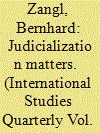|
|
|
Sort Order |
|
|
|
Items / Page
|
|
|
|
|
|
|
| Srl | Item |
| 1 |
ID:
113812


|
|
|
|
|
| Publication |
2012.
|
| Summary/Abstract |
Over recent decades a judicialization process of international dispute settlement procedures has taken place. Yet, the judicialization of procedures remains meaningless if the procedures are not used and accepted by disputing states in practice. Prominent theoretical approaches point to different conditions under which this is to be expected. Realism emphasizes the international distribution of power, institutionalism stresses the importance of the institutional design of international dispute settlement procedures, and liberalism points to the domestic institutional setting of the participating states. The article confronts these theoretical expectations with states' actual dispute settlement behavior in the international trade regime, the United Nations Security Council, the European human rights regime and the regime on the protection of endangered species in the 1970s/80s and 1990s/2000s, respectively. Its main finding is that, compared to realism and liberalism, institutionalism fares better in explaining the judicialization of states' dispute settlement behavior.
|
|
|
|
|
|
|
|
|
|
|
|
|
|
|
|
| 2 |
ID:
181663


|
|
|
|
|
| Summary/Abstract |
In the mid-2000s, India turned from a nuclear pariah of the international community into a de facto recognized nuclear power. Why and how did this status elevation come about? Realist, liberal, and constructivist perspectives point to important motivations but fail to elucidate the process of India’s (re-)integration. Our strategic cooptation argument conceives of India’s status upgrade as an exchange of institutional privileges for institutional support. To stabilize the nuclear non-proliferation regime, the United States and other nuclear powers offered India the privilege of being recognized as nuclear power—and of taking part in international nuclear trade—in return for India’s promise to provide additional support to the non-proliferation regime. This deal materialized because India was able and willing to provide the needed support and because the institutional setting provided favorable conditions for circumventing and overcoming third-party resistance. We thus establish “strategic cooptation” as a mode of adapting international security institutions.
|
|
|
|
|
|
|
|
|
|
|
|
|
|
|
|
| 3 |
ID:
085313


|
|
|
|
|
| Publication |
2008.
|
| Summary/Abstract |
By analyzing disputes between the United States and the EU under General Agreement on Tariffs and Trade (GATT) and the World Trade Organization (WTO) respectively, the paper demonstrates that the judicialization (or legalization) of international dispute settlement procedures (IDSPs) can contribute to states' compliance with (these) dispute settlement mechanisms. The article compares four sets of pairwise similar disputes which the United States had with the EU: the so-called Domestic International Sales Corporations case (which arose under GATT) and the Foreign Sales Corporations case (which was settled through WTO procedures), the Steel case (GATT) and the Patents case (WTO), the two Hormones cases under GATT and the WTO respectively, the Citrus case (GATT) and the Bananas case (WTO). In each of the four comparisons, the United States acted more in accordance with the judicial WTO dispute settlement procedures than with the diplomatic GATT procedures. We can therefore say that contrary to realist assumptions, the judicialization of IDSPs can contribute to their effectiveness. However, contrary to idealist assumptions the effectiveness of IDSPs does not automatically follow from their judicialization. Yet, as assumed by institutionalists, judicialized IDSPs are better than diplomatic IDSPs in sustaining states' compliance with these procedures precisely because of their normative and strategic effects.
|
|
|
|
|
|
|
|
|
|
|
|
|
|
|
|
|
|
|
|
|